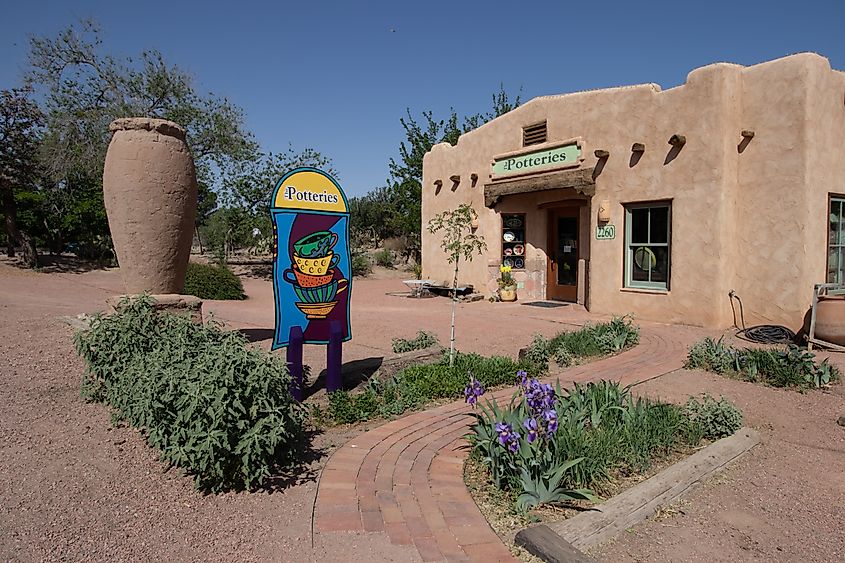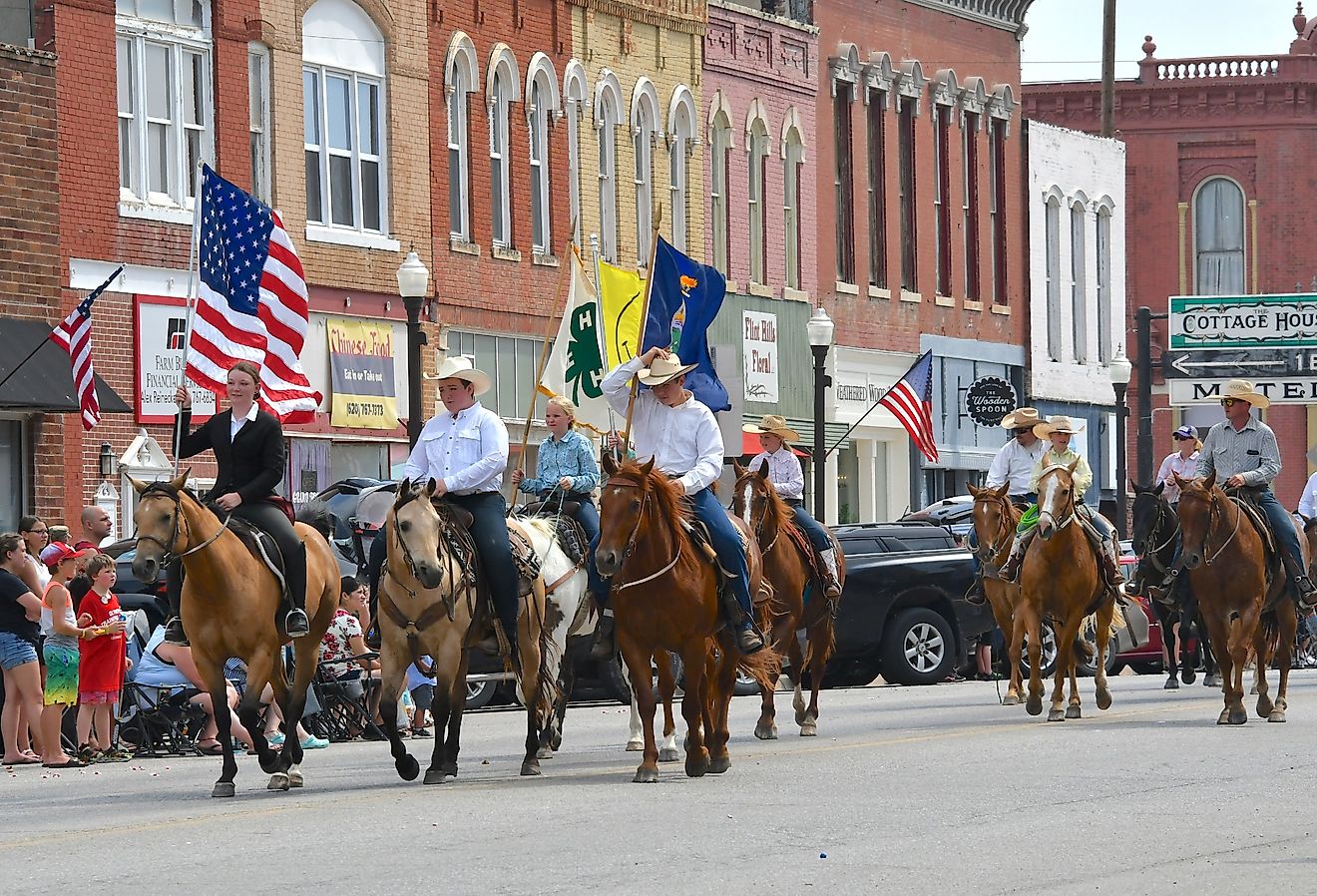
7 Oldest Founded Towns To Visit In New Mexico
Did you know that while New Mexico lays claim to the oldest capital in the United States and the highest, it would not be admitted to the Union until 1912, effectively becoming the 47th state to hoist the star-spangled banner? Though the Land of Enchantment waited for statehood for a long time, by the time it was admitted, Europeans had enjoyed uninterrupted settlement in the state for more than three centuries. Santa Fe itself was founded 10 years before the Pilgrims landed at Plymouth. Today, among New Mexico’s coterie of historic towns, are a number whose birthday predate that of the United States by several years.
Santa Fe

Santa Fe, the capital of New Mexico, is curled up in the northern Rio Grande valley at 6,996 feet above sea level. This incredible elevation makes it the highest capital in the United States. As to the highest city, however, whether capital or not, the bragging rights go to the town of Alma in Colorado. The credit for the establishment of America’s oldest capital goes to Pedro de Peralta, a Spanish colonial official, who, fresh from being appointed governor of New Mexico in 1609, persuaded some 200 San Gabriel settlers that the area was too dry to be the capital and also inconveniently far from other Pueblo Indian settlements. Subsequently, Peralta would found Santa Fe in 1610 and make it the second capital of what was then called the province of Santa Fe de Nuevo Mexico. Today, Santa Fe is a cute, little city and a popular vacation hot spot. It plays host to several historic structures including San Miguel Chapel, the oldest church in the continental United States.
Taos

Taos is secreted in the Sangre de Cristo Mountains, close to Wheeler Peak, the highest point in New Mexico. Founded in 1715, five years after Santa Fe, Taos is a dream destination for anyone who appreciates history and culture. For starters, Taos Pueblo, located a convenient 2.9 miles away, is both a UNESCO World Heritage site and National Historic Landmark. There are only 21 such destinations in the United States. Boasting a history that is rich and fascinating — and a culture that is among the most ancient and vibrant, Taos Pueblo is home to Indians who live much as their ancestors did in 1540 when the Spanish first set foot in the area. Framed by a majestic landscape, a first-time visitor will want to set foot in a town which is home to Taos Ski Valley, a top-notch ski resort — as well as the church of St. Francisco de Asis — one of the area’s most-recognizable crowd-pullers.
Albuquerque

In 1607, immediately after founding the city of Albuquerque, the jurisdiction’s interim governor Cuervo Valdez wrote a sprightly letter to New Spain’s viceroy then based in Mexico City thus: “I founded a villa on the banks and in the valley of the Rio del Norte ...in a good place as regards land, water, pasture and firewood.” The interim governor may have never been more accurate. Because what he established was “a villa on the banks of the Rio del Norte” — not a settlement. This is because the area around Albuquerque had been the site of human settlement almost from the beginning of human history. Today, encircled by the Sandia mountains and a group of volcanoes locals call the “Three Sisters,” the villa on the banks of the river is New Mexico’s largest city. And while Albuquerque boasts attractions that can fill pages, you may just want to stroll through Albuquerque Old Town and visit either the Rattlesnake Museum or the history-rich Albuquerque Museum.
Socorro

While sources are scant or contradictory regarding the specific year Socorro was founded, by 1852, it was chosen as the seat of central New Mexico’s Socorro County, which had just been established by the Territorial Legislature of New Mexico. By 1880, Socorro boasted a population of approximately 4,500, was reportedly wild and raucous, and had emerged to be the largest city in New Mexico. Curled up along the fifth-longest river in North America, Socorro’s history, however, goes back several years. It is almost certain that Socorro was first settled by Europeans in 1598, several years before Mayflower’s arrival on the East Coast. The town sat on the Camino Real, the 2,560-mile overland route from Mexico across the Río Grande to the Red River Valley. For an area famous for its mining heritage, first-time visitors may want to check out the New Mexico Bureau of Geology Mineral Museum, one of the finest geology museums you will ever come across.
Lincoln

The town of Lincoln lies in a rugged region framed by green hills and vast plains — and on U.S. Highway 380 — about 35 miles northeast of Ruidoso. European settlers first arrived in Lincoln in 1849. They would call their new abode La Placita del Rio Bonito, translated as “the place by the pretty river.” This was in reference to the Rio Bonito River which flows near the town. The town’s name would change in 1869 with the establishment of a new county. Both the new county and its principal town were named (or renamed in the case of the town) to honor the memory of Abraham Lincoln.
The town of Lincoln would be thrust onto the public mind because of its association with Billy the Kid, a notorious American outlaw reported to have murdered 21 men before sharing the fate of his victims at the relatively tender age of 21. If you are a Billy the Kid fan, you will not want to miss a tour of the Old Lincoln County Courthouse where Billy was brought to stand trial.
Mesilla

Centuries ago, the Indian Mansos, Pueblos, and Apaches roamed the wilds of the Mesilla Valley and the region around it. In 1540, Francisco Vázquez de Coronado, a famous Spanish explorer credited with several discoveries including that of the Grand Canyon, traveled through the province of Santa Fe de Nuevo Mexico — as the area was then called. Some accounts say he was looking for the mythical cities of gold. As you might already guess, he did not find them. While other Spanish explorers would travel to the area, the town would not witness any permanent settlement for almost the subsequent three centuries until after the treaty of Guadalupe Hidalgo in 1848 which ended the war between the United States and Mexico. Today, the heart of this picturesque town, defined by thick-walled adobe buildings, is much the same as it was a century ago.
Las Vegas

Not to be confused with Las Vegas, Nevada, the Entertainment Capital of the World, Las Vegas, New Mexico is a cute town of about 13,100 located along the Gallinas River — about an hour east of Santa Fe — and nearly 700 miles from its more famous Nevada namesake. The reason Las Vegas appears among the oldest towns in New Mexico is that as way back as 1862, it was already serving as the seat of north-central New Mexico’s San Miguel County. Today, Las Vegas is famous as a shipping point for wool and dairy products. While the picturesque vistas that frame the town can make any vacationer put Las Vegas on their bucket list, many people use it as a base from which to explore the natural drama of the Santa Fe National Forest.
The Takeaway
New Mexico, as everyone will agree, is anything but new. The state is as old as time — and boasts some of the oldest continuous human settlements in the United States. Among this number is Taos Pueblo, a tiny town defined by amazing adobe structures that have withstood time and tide for centuries. Besides Native American pueblos, New Mexico‘s oldest towns such as Santa Fe and Albuquerque — were already bustling towns way before the birth of the United States.











